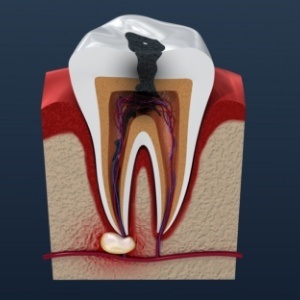Root Canal Therapy – Saratoga, CA
Getting to the Source to Save Your Tooth

While root canal therapy tends to have a certain reputation, you’ll quickly learn when visiting our practice just how much it has been overblown. Not only are we confident we can make your dental experience as comfortable as possible, but you’ll notice our team members truly treat patients like their own family. Feel free to read on to learn more about the root canal process and why you have nothing to worry about with Endodontic Associates Saratoga by your side.
Why Choose Endodontic Associates Saratoga for Root Canal Therapy?
- Three Specialists with Decades of Combined Experience
- Highly Advanced Technology Guiding Care
- Calming, Pleasant and Knowledgeable Team Members
What is Root Canal Therapy?

Root canal therapy is a very common procedure that we perform every day to relieve severe dental pain and save teeth that would otherwise need to be extracted. They are typically needed when the dental pulp, or soft tissue located within the tooth and its root, has become infected either due to decay or injury.
With a root canal, your dentist will remove this infected tissue, disinfect and clean the tooth, and place a filling material in the space to prevent reinfection. As endodontists, Dr. Nguyen, Dr. Lee and Dr. Tran are experts at performing this treatment, having taken years of advanced training after completing dental school.
If you have a persistent toothache or your family dentist has recommended that you get a root canal, you couldn’t be in better hands than with Endodontic Associates Saratoga. To schedule an appointment, contact us today.
Learn About Root Canal Therapy Safety
Signs You Might Need a Root Canal

As we mentioned above, a root canal is needed when the dental pulp inside a tooth has become infected or damaged. When this occurs, you may experience a few specific symptoms:
- A very painful toothache
- Increased dental sensitivity to hot and cold temperatures
- Pain when biting down on a particular tooth
- Redness or swelling on the gums near a tooth
- A bump on the gums near a particular tooth
If any of these symptoms sound familiar, you should immediately contact your dentist. Should the infected pulp go untreated, the tooth will eventually become so damaged that it cannot be saved. Fortunately, with a root canal, we’re often able to save even the most compromised teeth and ensure they look and function properly for many years to come.
Learn More About The Causes of Root Canals
Root Canal Therapy Step-by-Step

When you come to see us to get a root canal, the first thing we’ll do is examine your tooth to determine its current condition. We have highly-advanced imaging technology in our office so we can gain a full understanding of your needs before we begin any treatment. After going over these images, your root canal will involve the following basic steps:
- Your doctor will numb the area using local anesthesia.
- Your doctor will create a small hole in your tooth to reach the pulp.
- They will remove the pulp and clean the interior of the tooth.
- The tooth will be disinfected and the root canals may be shaped.
- Finally, your dentist will place a filling to seal the tooth.
Following a root canal, most teeth will need to be fully restored using a dental crown. You may experience a bit of increased sensitivity in the days following your root canal, but this will eventually abate and can easily be managed with over-the-counter medication.
Does Root Canal Therapy Hurt?

We would be remiss not to address this question! Thanks to modern endodontic techniques, our years of experience, and our technology, we’ll be able to keep you comfortable during the entire procedure. Often, the pain that is typically associated with root canal therapy actually stems from the initial infection and not the procedure itself. We’ll make every effort to ensure that you are comfortable when you come to see us for a root canal. If you have any questions, be sure to ask, and we’ll be happy to answer them.
Why We Recommend Root Canal Therapy

When recommending treatments to patients, we’re always doing so in the best interest of their oral health. This just as much applies to root canals as it does to any other treatment. Our goal is only to provide the best options for your unique case, as well as educate you on the treatments we provide. This way, we can ensure that you’re making informed decisions prior to undergoing any oral surgery.
Root Canal Therapy FAQs
We love for our patients to be well-educated. That is why we have so much information on our website, and it is why we are always willing to take the time to answer questions in person. Even before you come to visit us, however, you might find the answers to your most pressing questions about root canal therapy in Saratoga in the information below.
How Do You Plan for a Root Canal?
We do not simply start treating a patient without fully understanding their diagnosis. That is why we have advanced technology in our office that helps us plan for endodontic treatment. For example, our cone beam scanner allows us to get a detailed, three-dimensional view of a patient’s teeth, bones, and soft tissues. Armed with that information, we are better able to provide precise, efficient, and effective procedures.
What Should I Expect in the Days after My Root Canal?
Your tooth may be sore, and you may have some swelling in the treated area. Ice and over-the-counter pain medications should make you more comfortable. You will probably be feeling well enough to return to your normal routine the day after your procedure. However, you should still eat soft foods for a few days and avoid using the treated tooth to chew until after you receive a permanent crown or filling to protect it.
How Much Does a Root Canal Cost?
We’ll make sure you understand the cost of your procedure before we begin treatment. Although a root canal can cost a significant amount of money, it is cheaper in the long run than having a tooth extracted only to replace it with a dental implant later on. As your endodontist in Saratoga, our team will work with you to help you afford your treatment; we accept payment from all PPO insurance companies and we offer financing through CareCredit.
I’m Not in Pain — Why Does My Dentist Say I Need a Root Canal?
A toothache is one of the most common indicators that a root canal is necessary. However, there are cases when an individual is totally unaware that something is wrong with a tooth. This happens when a tooth “dies.” A dead tooth no longer has any blood flow to it, and it may not cause any noticeable symptoms at first, but if it is left untreated, it can lead to widespread infection and excruciating pain. Often, it is possible to recognize a dead tooth by its color; it will likely be darker than the teeth around it.





